#womens philharmonic
Text
Ouverture in do maggiore
Ouverture in do maggiore
Fanny Mendelssohn (14 novembre 1805 - 1847): Ouverture in do maggiore (1832). The Women’s Philharmonic, dir. JoAnn Falletta.
youtube
View On WordPress
4 notes
·
View notes
Text

In the 1960s, there was one actor who could justifiably claim that ladies prefer blonds. As the secret agent Illya Kuryakin in the TV series The Man from UNCLE, David McCallum, who has died aged 90, received more fan mail from young women than any other actor in MGM’s history.
With his Beatles-style haircut, his liking for black turtleneck sweaters (which created a fad among viewers nationwide), and an aloof and enigmatic air, through which he sneaked a fair amount of charm and self-amusement, McCallum made Kuryakin into a sex symbol of the period. He provided a trendy contrast to Robert Vaughn’s Napoleon Solo, his fellow spy, who went in for expensive suits and ties.
Although Solo and Kuryakin worked perfectly in tandem, their personalities were at variance, the former being urbane, easygoing and sociable, the latter more reserved, intellectual and intense.
The James Bond film craze had already taken off when The Man from UNCLE series was launched in 1964, so US audiences were used to laidback heroes and their villainous nemeses. However, it was surprising to find a hip Russian alongside the good guys of United Network Command for Law and Enforcement fighting against the evil organisation THRUSH (an acronym for Technological Hierarchy for the Removal of Undesirables and the Subjugation of Humanity), during the cold war.
McCallum, who played Illya with the slightest Russian accent and an occasional Scottish lilt, was also known recently for his long-running role from 2003 in the popular CBS crime series NCIS.
He was born in Glasgow. His parents were classical musicians; his mother, Dorothy Dorman, a cellist, his father, David McCallum, a violinist and leader of the London Philharmonic Orchestra. McCallum Jr won a scholarship to University College school in Hampstead, north London, before being accepted at Rada, where he studied from 1949 to 1951, having given up his ambition, and his parents’ wish, to play the oboe professionally.
In 1951, McCallum managed to satisfy his love for both music and the theatre by landing the position of assistant stage manager at Glyndebourne opera. However, he was called up to do his national service in West Africa. Demobbed as a lieutenant, the 19-year-old McCallum headed for the theatre, which mainly meant stage-management jobs in rep.In 1956, he half-heartedly posted off some photographs of himself to the Rank Organisation, which was scouting for young talent. The photos were seen by Clive Donner, who was casting his first feature, The Secret Place (1957), and he invited McCallum to do a reading.
“Although he was nervous, his voice was firm, and he was very good,” Donner recalled. “I sat and looked at him for a long time. He was very skinny, with a marvellous head and huge eyes. I think he was living in a bedsit in Archway at that time and had little money. We put him under contract straight away.”
Obviously under the influence of James Dean, the leather-jacketed McCallum, playing a young punk involved in a heist, does his best to express teenage angst. In Cy Endfield’s gritty thriller Hell Drivers (1957), McCallum plays Stanley Baker’s brother, on crutches as a result of a crime. In the cast, as a waitress, was 20-year-old Jill Ireland. McCallum and Ireland were to marry a few months before the film’s release. Soon after, they played young lovers in Robbery Under Arms (1957), an adventure shot mostly in Australia. At that time, the couple were often pictured together in fan magazines.
It was back to British realism with Basil Dearden’s Violent Playground (1958), in which McCallum plays a juvenile delinquent gang-leader. Despite a mite too posh an accent, he makes a vivid impression with his drawn features and mop of fair hair.
There followed several more conventional supporting roles, such as radio operators, first on the Titanic in A Night to Remember (1958), and a jumpy one in an Elstree-studio Burmese jungle in the second world war drama The Long and the Short and the Tall (1961). He was even more nervy in John Huston’s Freud (1962) as one of the first of the psychoanalyst’s patients, a young man who assaulted his father because of an incestuous love for his mother.
After appearing as a sympathetic officer in Peter Ustinov’s Billy Budd (1962), McCallum went to Germany to make John Sturges’s The Great Escape (1963), the most expensive PoW picture of them all. Among a starry cast, headed by Steve McQueen, James Garner and Charles Bronson, McCallum held his own among the Brits as Eric Ashley-Pitt – “Dispersal – who devises a way of getting rid of dirt from the digging of an escape tunnel. But more significant for him was the fact that Ireland, who was with him during the shoot, fell for Bronson. Ireland and McCallum divorced; he later married Katherine Carpenter, while Ireland married Bronson.
McCallum, who was already making his principal career on television, was given the secondary role of Kuryakin in The Man from UNCLE, but was soon granted equal billing with Vaughn after it rapidly became clear that he had a huge fanbase. Alma Cogan recorded a song called Love Ya, Illya, which became a pirate-radio hit in Britain in 1966, and as late as 1991, an Argentinian funk duo named themselves Illya Kuryaki and the Valderramas, after McCallum’s character and the Colombian football player Carlos Valderrama.
The first feature-film spin-off from the TV series, To Trap a Spy (1965), in which McCallum had a minor role, did little business. But the second one, The Spy With My Face, co-starring McCallum, really lifted off, followed by the box-office hits One of Our Spies Is Missing, One Spy Too Many and The Spy in the Green Hat (all 1966), and How to Steal the World (1968).
After The Man from UNCLE finished in 1968, McCallum continued to make guest appearances on TV until his second long-running series, the BBC’s Colditz (1972-74), in which he played Flt Lt Simon Carter, a hot-headed RAF officer who is impatient to escape.
Subsequently, McCallum appeared and disappeared as a scientist in The Invisible Man (1975-76), a US TV production, and co-starred with Joanna Lumley in ATV’s spooky sci-fi series Sapphire and Steel (1979-82) as the eponymous extra-dimensional detectives sent to Earth to monitor threats to the time-stream.
McCallum was seldom off television screens over the next three decades, making the occasional sortie into films. He also did some theatre in New York, where he and his wife had settled, notably Julius Caesar in a Central Park production (2000), playing the title role as “a senile old man, suffering from ideas of grandeur” according to the actor; and portraying the Emperor Joseph II on Broadway in Peter Hall’s revival of Amadeus (1999-2000).
In 2003, his looks belying his age, McCallum began playing Dr Donald “Ducky” Mallard, chief medical examiner, in the TV series NCIS, following the cases of the fictional agents of the Naval Criminal Investigative Service. His research for the part included studying pathology and sitting in on autopsies. He stayed with the show for the rest of his life, appearing in all 20 seasons up until this year. In one episode, a character asks another what Ducky looked like when he was younger. “Illya Kuryakin” comes the reply.
McCallum is survived by Katherine, their son, Peter, and daughter, Sophie, and by his sons Val and Paul from his first marriage; Jason, his third son with Ireland, died in 1989.
🔔 David Keith McCallum, actor; born 19 September 1933; died 25 September 2023
Daily inspiration. Discover more photos at Just for Books…?
39 notes
·
View notes
Note
As a bagginshield shipper, overall lover of Thorin, and member of an orchestra for like half of my life, I am in absolute love with your philharmonic AU. The only way it could be better is if it happened to me in real life (still gay of course, but like, in the other direction)
Ahhh thank you thank you! I’m really hoping to incorporate more actual instrument content, since we really only see Bilbo’s dulcimer once in An Unexpected Comic!
My partner and I spent about 8 years together in orchestra classes, and I’m still actively in an orchestra today, so I’m all for fruity orchestra love stories! I hope you’re able to experience a meet-cute in real life of equal silliness and shenanigans.
As I leave, I gift you Fem-Philharmonic!Bagginshield

✨ Ahhh women ✨
I appreciate them to no end, so why not turn every character into one? No ulterior motives, of course…

Okay so maybe one ulterior motive- but my statement still stands!
#froje’s ask box#the hobbit#thorin and company#the hobbit au#thorin oakenshield#the hobbit philharmonic au#bilbo baggins#bagginshield#fem!bilbo#fem!thorin#fem!bagginshield
111 notes
·
View notes
Text
There's a sentiment in low-quality media crit circles that basically boils down to saying "you would be all over this unlikable character if she was a man instead" or "your love of this pathetic male character betrays a misogynistic double standard because you don't act like this about women." Often I see this used to either defend their consumption of badly written media as praxis-- see: defenses of Rey's character as somehow empowering rather than admitting that the Star Wars sequels were badly written --or (even worse) as attempts to drag mature media subjects (people who got really mad about Barbie vs Oppenheimer) into mire of gender essentialism.
Of course this sort of thinking doesn't produce any art worth paying attention to. The answer is simple: leave behind playground gender politics and arguments over the female Ghostbusters and just watch better movies. Tár is one of those movies.
Lydia Tár is an absolute disaster. Born in a wet cardboard box. She's my little meow meow. She's a composer spiraling into a tormentous nightmare. She's driving a porsche. She's seeing things. She's bothering the neighbors. She's getting violent. She's a genius, she's perfect, she's losing control. I'm obsessed with her on a level this website reserves for Columbo and certain marionette-like actors. Todd Field wrote this for Cate Blanchett and no one else, and the gusto with which she carries the film on her shoulders is downright beautiful.
Though I will not discount the importance of representation (I've enjoyed too many movies about Italians to refute the beauty in finding shared experience through cinema), I'll note that when it comes to making meaningful art, representation should not matter. I'm not a mean lesbian conducting the Berlin Philharmonic, nor do I necessarily want to be considering the events that unfold in the film, but even for as supremely unlikable as Lydia is in this movie, she's a star you wish to follow despite her downfalls of her own making.
There's a moment early on in the film where Lydia teaches a class at Julliard, and is confronted by a student who dislikes Bach on the grounds that he is a white man and presumably misogynistic due to the bevvy of children he had with his wife. This student is a self-described "BIPOC pangendered" individual, and a bit of a strawman for the sort of intellectually dishonest reasoning that's permeated pop culture criticism. Lydia, and the film itself, use this character as a punching bag, reaming him out in front of the class for the admittedly ridiculous positions on artistic analysis that are increasingly being touted by the people who unfortunately matter to this sort of thing.
I will admit, this is a bit of a soapbox, but the movie keeps one foot on the ground, as the scene ends in Lydia stating the premise of her entire character: she wishes not to be judged for her womanhood or sexual orientation, but rather for her actions. For her art. What she has done, Lydia posits, is how she wants history to classify as who she is.
Unfortunately for Lydia, she's an awful person who takes advantage of those around her, cheats on her wife with her own students in relationships that may be consensual but are certainly wrong, and ultimately deserves the blacklisting from the industry that she receives. Not relatable at all, and for sure to turn off the guys who walked out of Promising Young Woman complaining that Carey Mulligan's character hated men.
Yet Tár takes this human trainwreck and crafts a psychological drama the simply doesn't let you look away. Watching Lydia Tár experience the ultimate #WomanMoment as she spirals into insanity makes you understand all the awards this movie won. This is a great film, and like the main character, deserves to be judged for what it does rather than who it stars, though Blanchett's performance as Tár will keep me obsessing over this movie for a long time.
14 notes
·
View notes
Text

Little Women Famous Artists Modern AU
"The March family makes headlines once more as oldest sister Meg March takes to the red carpet for the premiere of her latest movie.
The young starlet turned heads in an understated pink lace gown, and with her handsome new husband, producer John Brooke, on her arm. Also attending was the actress' sister, Josephine March, whose most recent novel has been steadily climbing the ranks on the New York Times bestseller list. The two sisters have been seen together for a long time at premieres, award shows, and parties, and it's even rumored that the two might be working on a project together. When asked about the possibility of joining her sister on a movie set, Jo March had no comment.
But while the two sisters have talent to spare, they're certainly not alone, as the spotlight seems to run in the family. If you follow classical musical news, you'll know the name Beth March, who has been a featured pianist with the Massachusetts Symphony Orchestra for years now, and has even performed with a few other prestigious groups, including the New York Philharmonic, with talks of a permanent contract in her future.
Last but certainly not least, youngest sister Amy March has been gathering her own attention in the art world, as, fresh out of CalArts, her oil paintings have been must-gets in a few exclusive auctions around town, and the young prodigy has even teased an exhibition of her recent watercolor collection in her thriving social media accounts, though the where and with whom remain a mystery. Could the rich (and handsome) Theodore Laurence, heir to his grandfather's production company, and longtime benefactor of the arts, as well as friend of the family, be her sponsor? The two have certainly been seen together often, lately, leaving us wondering - is it an old friendship, a business partnership, or something more?
There must have been something in the water at the March household, because these sisters have been taking the world by storm, and for sure momma Margaret March is beaming with pride. We, for one, can't wait to see what these little women do next."
#little women#meg march#jo march#beth march#amy march#theodore laurence#aesthetic#moodboard#little women au#little women moodboard#little women fanfiction#inspired by#little women 2019#also very slightly inspired by tshoeh#my writing#don't really know what this is#it's that scene in the movie where jo talks about how they should all be artists and make their own way in the world but modern au i guess#they just really stuck with me and i love them all#also this wasn't meant to be this long lol#and it was supposed to be only about the four of them but apparently i cannot help myself from making anything lw about amy x laurie dang#also i have no idea how the art world works 😂#sorry if this makes no sense if it's not how contracts and exhibitions work#this just came from impressions i got from pop culture and some light googling#my posts#my moodboards
15 notes
·
View notes
Text
youtube
On Paul Robeson's 126th birthday, I would like to celebrate one of his lesser known songs. His rendition of Beethoven's Ode to Joy with his own interpretive translation of the lyrics. It captures the humanistic spirit of the Enlightenment, French Revolutionary and Romanticist eras in which Beethoven worked. And the egalitarian ideas Robeson championed. Those who struggle are supported and those who might dominate are kept in check. It is the deepest level of solidarity and fraternity where none are allowed to fall. A powerful antidote to an age of unchecked individualism, competition, cruelty and glorification of strength for its own sake.
..Build the road of peace before us,
Build it wide and deep and long
Speed the slow and check the eager,
Help the weak and curb the strong.
None shall push aside another,
None shall let another fall
March beside me, oh, my brothers,
ALL FOR ONE AND ONE FOR ALL
Paul Robeson Sings For The Underdog
During his career, vocalist Paul Robeson usually avoided singing classical music, once stating that European traditions had “nothing in common with the history of my slave ancestors.” He almost exclusively devoted himself to spirituals, protest songs and folk ballads, championing the oppressed through music. That was certainly the case with his unlikely but devoted relationship with group of working-class miners in Wales, whom Robeson supported in their protests against low wages and unsafe working conditions.
On the occasion he did perform classical works, he reframed them as folk music. Robeson’s “Ode to Joy” replaces the orchestra with a single piano, and he opts to sing in English rather than German, driving home the message of brotherhood to his English-speaking audiences. Robeson’s leftist politics lead to his blacklisting during the McCarthy Era, leaving him unable to travel with a revoked passport. So when the Welsh miners invited him to perform at a festival 1957, his only choice was to sing across the sea via a transatlantic telephone line. He dedicated his version of “Ode to Joy” to the crowd of 5,000, supporting their struggle for what he called “a world where we can live abundant and dignified lives.”
youtube
Chilean Women Protest A Violent Dictator
In 1973, military dictator Augusto Pinochet assumed power in Chile and oversaw the imprisonment and torture of tens of thousands of people belonging to opposition groups. At the risk of their own lives, female protesters gathered outside torture prisons to sing the “Himno a la Alegria,” a hymn based on “Ode to Joy,” to bring hope to those being held inside. You can see a clip of the protest in the documentary Following the Ninth:
youtube
Another of his lesser known performance is of Luther's famous hymn, which launched in the religious sphere the bourgeois democratic revolt against Medieval Feudalism.
youtube
While we are still a long, long ways away from the just society Robeson dreamed of, we have at least made some progress from the McCarthyist days in which he was blacklisted, to being officially recognized today in our nation's capital.
3 notes
·
View notes
Text
YouTube Links: Beach Gaelic, Dvořák 7
Comments:
Beach Gaelic Symphony
Gotta get some women composers in here! Lots of Dvořak influence too.
Dvořák 7
I saw Dvořak's 8th and 9th symphonies on the list and knew I couldn't let you get away with not including his 7th. It's a hot take, I know, but not only think do I think it bests the Czech maestro's two follow-ups — I also believe it to be the greatest symphony ever written. And I've heard a ton! It's a stormy piece, full of diminished sevenths, that weaves bold Germanic influence (particularly Brahms) and the rustic Czech folk music that defined Dvořak's earlier pieces.
(Timestamps from this recording, with Kubelik conducting the Bavarian Radio in 1978. I wish his '71 recording with the Berlin Philharmonic was on YT but I guess we can't have nice things.)
Dvořak starts off with low rumblings from the timpani and strings, and introduces a terrifically Brahmsian 6/8 theme. The first movement is amazing, if not perfect — setting a high bar for a symphony that somehow still gets *better with each movement*. The second movement, which begins at 11:41, is a phenomenal work of beauty from the moment you first hear the wistful clarinet theme. It first reaches a climax at 14:53, and then later at 18:24. Supposedly, part of the inspiration for this movement was the death of his mother, which makes it all the more impactful. The following scherzo (20:55) does an incredible job of balancing a melody and counter-melody, and the trio (23:27) helps make this one of the best scherzi out there, combining a light touch with a resonant underlying emotional current. However, as good as the first 3/4 of the symphony is, it pales in comparison to the magnificent finale vaguely in sonata form (28:17). Immediately heard is a rising octave theme that collapses to an almost frightening G♯ (tritone in D minor), later developed into a soaring arpeggio theme in the strings (29:07). A more serene secondary theme follows, before leading into the development, starting with the clarinet playing the arpeggio theme at 31:27. The initial octave theme and the arpeggio theme combine at 33:14 to mysterious effect. Finally, at 36:19, the piece ends with a dramatic — though not drawn-out — climax, famously concluding with a Picardy third.
7 notes
·
View notes
Text
Past Fashion in the Demon World - First Bloods
Reminiscence of the past
Let us be clear: the founder race is dying.
Their previous king's sanity had declined past the point of denial.
Didn't even try to save his people.
The mad king's overthrow - was planned by collective force.
The war. the End. the plague of the land.
And those still alive, erased from memory and then eaten away by the disease. Locked and sealed in the dark.
Vomiting blood and bitter regret.
Like the Great Roman Empire - Idleness and Decadence led to their downfall.
The war had ransacked everything. Every element of the past, of the golden age of the Ancestors. Endzeit took the living and left only meaningless trinkets of memory.
Burai kept some of those and even more: Menae's dresses, some of her jewellry...
and a daughter as the hidden remaining evidence of an ancient time. An ancient world he had conquered.
The two last remaining Founders. First children of the Moon
Today protect body and soul, the last bits of their glorious heritage.
The founder race thrived in the centre of the demon world
cold, dry winters
quite pleasant summers and mid-seasons full of soft colours.
mountainous land (not to the level of the Adler's but still high enough so they could get fresh gusts of wind), they towered over the other territories.
Their hegemony was supreme, at first even quite brilliant. They were self-sufficient, feared but respected.
Not the slightest interest in human civilisations. For them, humans were slaves, food, and entertainment.
At the top of the hierarchy, Founders were the reference of good taste and what was fashionable at the royal court would be in vogue everywhere else.
due to similar weather conditions, some elements of the First Blood fashion could be compared to a strange mix of old European apparel.
which is crazy because the timeline is so fucked up we don't even know where to situate the founders existence in human history because they were ahead of their time: from the clothes silhouette to the fabric used and the skills of their tailors.
Let's dive into blood into a 'brief' description of founders' fashion.
Aristocrats' clothing. Because like everywhere else, the world doesn't seem to care about how the commoners would dress. We prefer rare silks and gold over anything.
But the shiniest stars are always the dying ones.
Anyways-
male fashion
can be sum up in four points :
18th-century "habit à la française" (I'm french but I only read it with a fake British accent it's terrible)
Imperial Russian court and military uniforms
Alucard from Castlevania (especially the one from 1997)
and Bloodborne

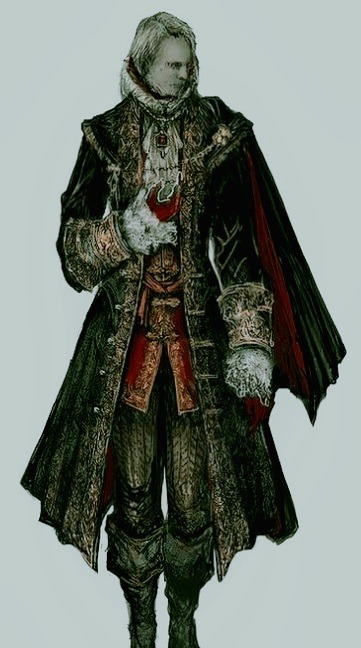
what? I should develop?
the 18th-century/Alucard style. soft ruffled shirt, large embroidered silk cravat, heavy linen pants with high leather boots sat on top, again a goddamn cloak...on top of a pirate coat-
founders men were responsible for the "romantic vampire aesthetic" but Karlheinz will never admit it.
they liked form-fitting clothes, slightly tight on the chest because they wanted to accentuate the strong lines of their necks and outline their shoulders to make them look broader.
yeah they're insecure like that😔
overcoats heavy with wealth.
it could be brown, it could be blue, it could be violet-You see what I'm doing here.
some buttoned, some buckled but all embellished with stitches of silver and gold
long hair was a genderless preference.
Well. Women were expected to keep them long because blablabla women and feminity blablabla but for the men who chose to have long hair (like Carla) it was perceived as a sign of power??
like they considered that you have to be particularly deft or confident in your magical abilities to be able to fight with long hair (they're not particularly wrong though)
but I prefer to think that they liked long hair because it contributed a LOT to their dark romantic aesthetic.
anything for the drama.
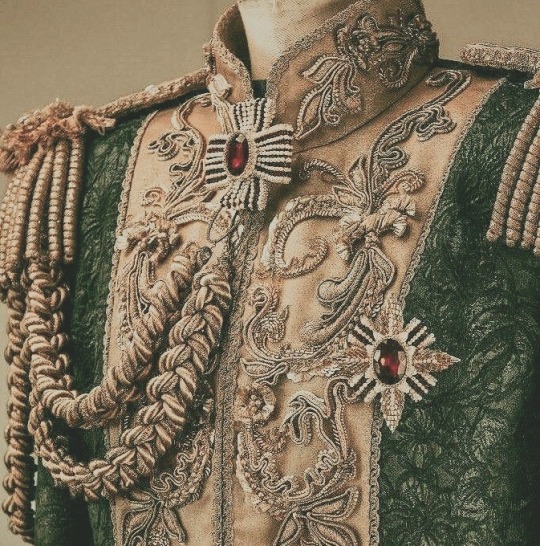
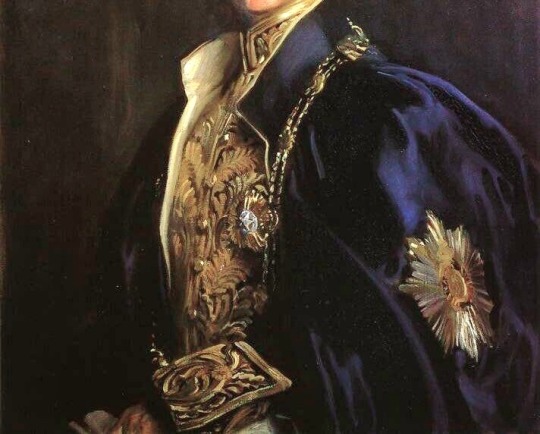
female fashion
a glorious mix of 18th-19th century russian court fashion and... 50s old hollywood dresses. (don't ask me, they're stylish and visionary)
beautifully designed, from the delicate shape of a butterfly sleeve to the way it embraced the line of the shoulders
distinguishing and elegant, the off-shoulder elongated the neck and the low neckline was lined with small almost-transluscent pearls and silver threads to capture the light and make their skin radiates under the fine diamond necklaces.
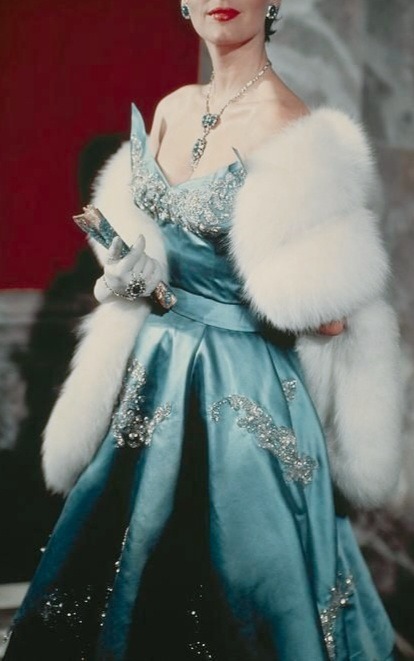
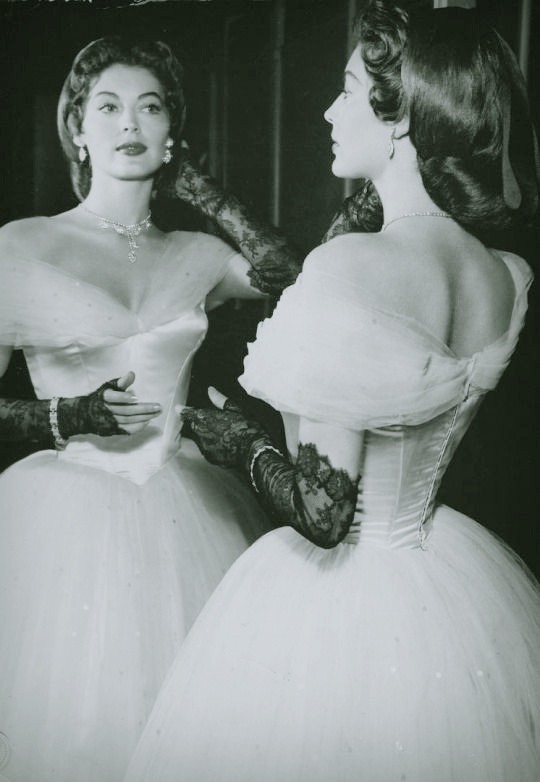

corsets obviously but we are far from the killing corsets Cordelia could wear to have one hell of a waist. In comparison, they were comfortable (again, their tailors were that good)
silk opera gloves, sometimes lacy ones to match the men's stupid shirts 🙄
layered skirts but not the bulky type (not the Empress Sissi style). Founder women didn't like the ballooning silhouette and found it unattractive as it didn't do them any favour.
preferred drawing attention to their waist and cleavage but also to their height.
skirts had to compliment and accentuate the length of the body as the First Blood women were taller than most female demons. (well see Cordelia. She's the tallest among the three wives and I suspect her to be actually quite 'short' for a founder woman.)
their silhouette is almost fae-like: lithe, lean and strong despite being overprotected and confined to that castle 😔
so the skirts were long, organza or taffeta draped the main skirt to give some dimension to the dress - no crinoline. maybe a bustle to add a little to their hips and bums
because the Founders can only be killed by decapitation, they provocatively exposed their necks a lot in their clothing style.
open ruffs (like a smaller Medici collar), off-shoulder, v-neck or sweetheart necklines...
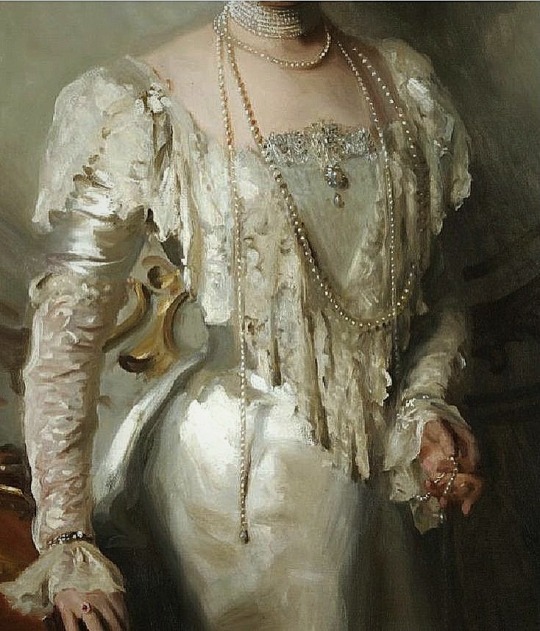

Fate being a cruel mistress, this small game of silent provocation was definitely not what caused their ruin.
But you know what happened.
Now most of these lavish gowns and sumptuous coats are just crumbs of inspiration from an old system, left to be pecked.

#diabolik lovers#dialovers#diabolik lovers headcanons#diabolik lovers fashion#diabolik lovers lore#carla tsukinami#shin tsukinami#krone#giesbach#karlheinz#Spotify
82 notes
·
View notes
Text
Glowing Review for Album, SHARDS
I received an amazing review of my latest album SHARDS in Fanfare Magazine! Here are some of my favorite bits:
"Her music positively buzzes with energy…There is no doubting that Sarah Wallin Huff has a distinctive voice that is well worth hearing, and she is well served by a set of fine interpreters."
"There is no doubt that DodecaFunky is a great title…The “funk” element is rhythmically garlanded, so there is the impression of a level of extra complexity. The piano break around three minutes in is guaranteed to raise a smile, being compositionally cheeky and offering pianist Yuko Hagino the chance to shine (as she does). Brady is a fine flutist, a true mistress of her instrument, not least in the multiphonic moment. Wallin Huff’s sense of lightness is the mark of a versatile composer. This piece represents a nexus between hard bop, swing, and dodecaphony."
"The ensemble piece Of Roses and Lilies reveals another aspect of Wallin Huff’s output, full of repose and glowing timbral and harmonic beauty. The music is sometimes unashamedly expansive, post-Romantic and even filmic, and brilliantly written for solo soprano…and a six-member women’s chorus. It is only later that this is colored with more extended harmonies and somewhat clashing lines."
"A “Gothic Suite” based on poems by Edgar Allen Poe, Nevermore was composed for violist Charlotte Goode between 2019 and 2021. The first movement is “Raven”: A man pines for his lost lover, Lenore; a raven arrives and says the one word, “Nevermore,” mocking the narrator’s sorrow. The viola line is both long-breathed and longing; some gestures from Liszt’s dark side permeate the piano. The dedicatee is also the performer here, and Goode and Hagino work perfectly together. There is a real sense of illness to “Annabel Lee”… Goode’s tuning is perfect, her phrasing eloquent and heartfelt."
"The final piece [The Dark Glass Sinfonia] dates from 2017. I imagine Forteian pitch-class set analysis might have a field day here: the piece is hexachordally based, but blends free atonality with nodal harmonies in an attempt to represent the eternal flux of the Soul. This short work of less than eight minutes is fascinating in its harmonies: They seem pregnant with meaning and potential. The Janáček Philharmonic Orchestra Ostrava is in top form, with some particularly impressive trumpet solos. For all its background theory, there are moments of real harmonic warmth. The piece is subtitled “We See Through a Glass Darkly,” and until about five minutes in it keeps to the mood of the title; then an Ivesian riot ensues (slightly toned down from those of the Master). It certainly sounds like the Ostravans have fun here, as the performance takes on an energy akin to live performance. It has a rather filmic climax. This is a well-composed piece that traverses a wide terrain over its brief duration."
Read more detail at the link below!
And, if you haven't already, be sure to save this album on your favorite platform! :)
#contemporary classical works#album review#women composers#neurodivergent composers#chamber music#symphony orchestra
3 notes
·
View notes
Note
Here I was thinking to escape twitter after (rightfully) dragging racist old women busy attacking black Team LH unprovoked and now this...Happy race week in a few hours I guess.
Ok, since I've never been on a date/dated anyone I always picture a perfect date that includes a private show with a full philharmonic orchestra playing my favourite chaotic piece.
What is your ideal date (if it were with Lewis)?
She actually came for my friend and for ages she was telling us not to respond to her but we did anyway 😂😂 fuck that old bag of cat shit!
That sounds so cute! Very classic and I love it!
My ideal date is centred around all the food Lewis doesn’t eat 💀 but because he’s a gentleman, he’d let me indulge anyway. And then after, a ride around the city , parking somewhere and just talking. I live for debating and sharing ideas and ideologies. I would love to do that with him 🥰
10 notes
·
View notes
Text
Il Mississippi
Florence Price (9 aprile 1887 - 1953): The Mississippi River, poema sinfonico (1934). The Women’s Philharmonic, dir. Apo Hsu.
youtube
View On WordPress
0 notes
Text


Went to the philharmonic with a friend today. An employee followed me into the (women’s) restroom cuz of how masc I’m presenting. Caused conflicting feels cuz on the one hand “oh I’m passing enough for you to say I’m in the wrong bathroom” but on the other hand “ma’am, this is a stalled restroom. What’s the worst I could be doing in here; coke? What are you wanting to do, check my genitals? What are you gaining from this? The bathroom is empty.”
#personal#me#selfie#nonbinary#lgbtq#queer#it’s a weird feeling where I’m angry it happened but happy I pass
4 notes
·
View notes
Note
my personal ranking

i cant do rankings im too partial for that but my opinion on your opinions
jeff buckley sang like rent was due! if jeff buckley covered your song it's not your song anymore its his and also you're gonna think about it at sunrise for the rest of your life. he had to die before the indie folk girlie's (gn) entered the scene otherwise there'd be carnage.
I hadn't heard bettye lavettes cover before but I love it. I didnt think I would at first but I love what she did to the song. its really amazing when artists aren't afraid to play with the pacing or rhythm of a song they're covering especially in tandem with how she altered the lyrics too. cunt indeed.
i can believe we are augustine truly love and miss the mama in question but I hate what they did to the word me 1:19 seconds in. it's a good cover but it's just that. doesn't radicalise or change it much it's just a good cover ! no shame in that !!
bob dylan voice. godbless joan for being there, yes girl give us something !!!! also I like hearing the audience laugh, some soul. its also fun bc it's such a,,,, I don't wanna say sad but you know what I mean, nostalgic(?) melancholic (?) song it's fun to hear it more upbeat and tempo and hearing them have fun as they do it
bob dylan voice but he wrote the songs so whatever ig
rod was singing as if he was reading the lyrics on a scrap of paper as he went. boring. uninspired.
ITS THE VOWELS !!!! i love a good scouse accent. anyone who knows me knows I love a good fucking accent. you garble your vowels and i want you but not like this george!!!!! you know that annoying tiktok voice filter that warps your voice, george harrison luv.
extra
jack johnson - so embarrassing I actually dig it. i like how the guitar sounds. does it kinda sound like some guy at a party pulling out his guitar? yeah? and it's working on me, sorry. but then he starts singing smth else.
joan baez - godbless her. we need more women to cover it. the speed in which she sings it though.
johnny cash - 😔 idk why he started at the end and he changed colour of the sun caught flat to dark dark night. im not feeling it. just discarded the best parts of the song
ricky nelson- whatever
#ameeras.got.mail#betsy tag#this was fun i was reading when i got your ask and i immediately threw it to the side to queue up every cover i could find#we should do this again with mire songs. but im nit as opinionated on other sings so maybe not#the other woman thats a song i have an opinion on#bc again. jeff slayed.#anyway yeah while i personally cant make a numbered list i comoletely agree with yours#i hit the audio limit :( sorry ricky. thats how ehatever it was
9 notes
·
View notes
Text
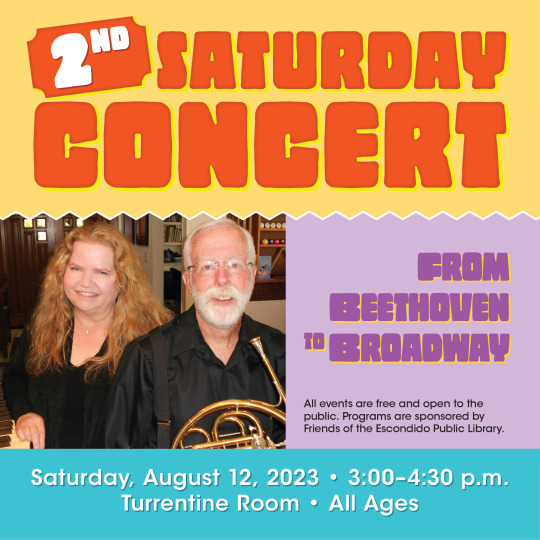
Join us on our Facebook page and upstairs in the Turrentine Room on August 12, 3:00 to 4:30 p.m. for a live performance from Bruce and Beverly Reese Dorcy: From Beethoven to Broadway!
About Bruce and Beverly:
Beverly Reese Dorcy (piano/percussion) was formerly principal percussionist with the Fresno Philharmonic, Tacoma Opera, Bellevue (WA) Philharmonic, Women's Philharmonic, Monterey Opera, Golden Gate Opera and Classical Philharmonic. She has also performed extensively with the San Diego Chamber Orchestra, San Diego Symphony, San Diego Opera and Sun Valley Summer Symphony in Idaho.
Bruce Dorcy (french horn) was a member of the National Ballet of Canada and Canadian Opera Orchestras for 24 years (asst. principal/third horn) and the Tafelmusik Baroque Orchestra for 11 years (principal horn). He also played on Broadway in New York for 6 years ("Fiddler on the Roof", "Promises, Promises", “Man of La Mancha”). Occasional performances with the New York City Opera, Seattle Symphony, Seattle Opera, Toronto Symphony, San Francisco Opera, Western Opera Theatre, Opera San Jose, Monterey Opera, Monterey Pops, Golden Gate Opera, San Diego Chamber Orchestra, Las Vegas Philharmonic etc.
This event is presented by Friends of the Escondido Public Library.
#2ndsaturdayconcert#freeconcert#libraryconcert#bruceandbeverlyreesedorsey#library#escondidoca#cityofescondido#sandiegocounty#northcountysandiego
2 notes
·
View notes
Text

Good morning! I hope you slept well and feel rested? Currently sitting at my desk, in my study, attired only in my blue towelling robe, enjoying my first cuppa of the day. Welcome to Too Much Information Tuesday.
Dog food is tested on humans.
Penis enlargement surgeries are free in Cuba.
2.7 million Americans work for either Walmart or Amazon.
Scientists have discovered a species of algae that tastes like bacon.
1.5 million trolleys are stolen from British supermarkets every year.
If your parents are happily married, your risk of divorce decreases by 14%.
Jack Nicholson once got detention at school every single day for a year.
Walt Disney used to pack his testicles in ice to improve his sperm count.
In 2010, a doctor in Blackpool spent £1,200 trying to win a cuddly toy at a hoopla stall.
The first pornographic film came out in 1895, just a few months after the first regular movie.
Nelson was about 5’ 4". His statue on top of the column in London is about 18ft. That's Horatio of about 3:1
During the 2012 Russian election (when Putin was elected for a third term), one region registered a voting turnout of 146%.
If your name begins with a letter that is towards the end of the alphabet, you are likely to struggle more when getting your first job.
Every year, a village in Montenegro hosts a ‘lying down’ championship. This year's champion spent about 60 hours lying down.
2022 saw the highest number of people ever diagnosed with gamophobia, which is the fear of commitment, relationships and marriage.
Elon Musk and Bill Gates have joined forces to make a penis enhancer. Early reports say they plan to name the product Elongates.
Research at MIT has shown that only half of perceived friendships are mutual. Only half the people you consider friends think of you as a friend and vice versa.
In 2008, a Japanese man found a homeless woman living in the top compartment of his closet after setting up a security camera because his food kept disappearing.
In ancient Greek mythology and folklore, the act of women exposing their genitals was believed to have the power to ward off evil spirits or demons. A practice known as ‘anasyrma’ or ‘ana-suromai’.
In 2019, an accountant in London who’d endured years of being bullied at work decided to ‘go out with a bang’ and stole £170k from his employer. He spent it ALL in one weekend on prostitutes and cocaine.
In the town of Whittier, Alaska, almost everyone lives in one building. 90% of the town's residents live in one 14-storey building that also houses a post office, shop, police station, health clinic and a bed & breakfast.
In 2010, UK retailer GameStation claimed to own 7,500 souls after putting a clause in their online terms that stated, "By placing an order via this website ... you agree to grant us a non-transferable option to claim, for now and for ever more, your immortal soul."
In Indiana, a 25-year-old delivery driver, Nick Bostic, risked his own life to save five children trapped in a house fire, running into the burning building and safely escorting four children outside and then leaping from a window with the fifth. He made a full recovery.
In 2010, a Harvard student decided to give up on life and shot himself in the head leaving behind a suicide note, explaining in thorough detail why “life was meaningless”. The suicide note he left behind was 1905 pages long.
On April 28th, 2023, the ground really moved for one woman during the second movement of the LA Philharmonic’s performance of Tchaikovsky’s 5th Symphony, when she experienced a “loud and full body orgasm.” Several concertgoers described the woman’s climactic moment from the balcony at the packed Walt Disney Concert Hall. “Everyone kind of turned to see what was happening,” Molly Grant, who was sitting near the overjoyed woman, told the Los Angeles Times on Sunday. “I saw the girl after it had happened, and I assume that she … had an orgasm because she was heavily breathing,” she said. “It was quite beautiful,” Grant added. An audio clip purporting to capture the woman’s moment of ecstasy has gone viral. British composer Magnus Fiennes, brother of actor Ralph Fiennes, also was in attendance. “A woman in the audience had loud and full body orgasm during the 5th’s second movement. Band politely carried on,” he said on Twitter. However, some social media users expressed their doubts about the incident, with one who was present suggesting that the woman had a medical emergency. Fiennes insisted, “It absolutely happened. Was in close proximity and had no less than eight other friends attending. All reached a similar conclusion.” Classical pianist Sharon Su added in a tweet that she “checked with someone who works at the LA Phil and they confirmed” that the incident was real and that the orchestra did not stop playing during Tchaikovsky’s 5th. The LA Times reported that its sources and the audio clip corroborated the accounts that the orchestra did not miss a beat during the explosive moment. Music agent Lukas Burton told the LA Times that the woman’s loud moan was “wonderfully timed” to a “romantic swell” during the performance. “One can’t know exactly what happened, but it seemed very clear from the sound that it was an expression of pure physical joy,” Burton told the paper.
Okay, that’s enough information for one day. Have a tremendous and tumultuous Tuesday! I love you all.
#mixcloud#mi soul#dj#music#new blog#lockdown#coronavirus#books#democracy#brexit#cronyism#election#tuesdaymotivation#radio
3 notes
·
View notes
Text
The Third Day by Chochana Boukhobza

The only time she came alive was when she was playing the cello. The moment she bowed her head towards her instrument, the greyness vanished, light entered her gaze and her body came alive.
From Chochana Boukhobza an awarded winning Jewish author her novel The Third Day, translated by Alison Anderson, despite coverage in many outlets has appeared to gain little traction with many readers. Set in the 1980s, the story unfolds over three days in Jerusalem following two Israeli women cellists of different generations. Absent for years living in the US, Elisheva is a holocaust survivor who hasn’t truly escaped and is out for revenge against a Nazi. Unaware of her plans Is her protégée Rachel a 23-year-old who left family, and love to pursue her musical dreams. With their arrival back for a concert with the city’s Philharmonic Orchestra it also becomes clear the great value of playing music in both characters’ lives. Music after all allows us to reside and express something different than in words alone. Too winding through the city, characters, and memories the book works into a reflective thriller very much concerned with history, shared and more personal, and what the past may mean for the present and future.
The Third Day by Chochana Boukhobza is available in English, translated by Alison Anderson, in print and digital from MacLehose Press
#french literature#the third day#chochana boukhobza#le troisième jour#wit month#francophone50#cw: fatphobia sexism infidelity blood murder antisemitism suicidal thoughts mass murder torture pregnancy hospitalization
1 note
·
View note